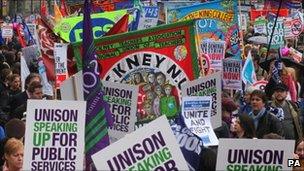Anti-cuts demo unrest sees 149 charged
- Published
WATCH: Commander Bob Broadhurst message to protesters
Police have charged 149 people after unrest broke out alongside a peaceful anti-spending cuts protest in London.
A mob attacked police officers, smashed windows and daubed banks and shops with paint on Saturday after a TUC march.
A total of 201 arrests were made, most of them after a campaign group staged a sit-in at a luxury store on Piccadilly.
Cdr Bob Broadhurst defended the police approach, saying they "did their best" to respond to the movements of the troublemakers.
But he said: "We just cannot protect every building."
Cdr Broadhurst had a message for those who had caused trouble on Saturday: "You haven't got away with it.
"We will be studying all the CCTV, all the stills photography, we will be interviewing people. We will be coming looking for you.
"If you have committed violence or (caused) damage we will be arresting you fairly soon."
Home Office Minister Nick Herbert said he would not criticise the police and added: "They had a difficult job on Saturday because there were a very large number of people who were demonstrating, the vast majority entirely peacefully, but a small minority were bent on violence, criminal damage and trespass."
He said they had been criticised in the past when they used other tactics, such as "kettling".

The police said the vast majority of the demonstrators were peaceful
Meanwhile a political row is brewing after Labour demanded Conservative London Mayor Boris Johnson retract claims that leader Ed Miliband was "satisfied" with the violent protest scenes.
Writing in the Daily Telegraph, Mr Johnson, external said it appeared the only plan Mr Miliband had for solving the country's fiscal problems was to "get a load of aggressive crusties and Lefties" to cause "argy-bargy" in London.
Labour's deputy leader Harriet Harman said he should withdraw the "outrageous allegation" immediately.
"It's completely wrong and I think it really says more about his twisted politics than it says about us."
Scotland Yard said the violence from some people "could not have been more markedly different" to the TUC event.
Business Secretary Vince Cable said the government would not change its economic strategy as a result of the TUC protest.
The government is embarking on a programme of spending cuts totalling £81bn, which it says is necessary to eliminate the budget deficit. Opponents argue that cuts on this scale will undermine economic recovery and see unemployment rise.
Store occupation
The TUC said 250,000 to 500,000 people attended the march, which passed off without incident.
But a separate group - wearing scarves to hide their faces - started attacking shops and banks, clashing with some of the 4,500 police officers on duty.
The Metropolitan Police has faced some criticism of the way it handled the violence, with former Deputy Assistant Commissioner Brian Paddick saying officers should have done more to protect property.
Cdr Broadhurst told BBC Radio 4's Today programme: "[The plan] failed in parts. But I think probably our plan prevented more widespread violence and disorder."
He said although there had been "chatter" on the internet about planned breakaway violence, there was not enough evidence to take actions against individuals before the event.
"If you look back to what it said on the internet beforehand, they were targeting practically every premises in London. We had a plan that did our best to respond wherever they went," he said.
Cdr Broadhurst has warned that similar groups may also be planning to target the wedding of Prince William and Kate Middleton on 29 April.
He said the Met had been looking into increasing its use of stop-and-search powers for that event.
"The royal wedding has a different tenor to it. It's a security operation largely, in certain parts of London. I think it's quite appropriate that a police service has different powers in terms of security, as against people's rights to come and openly protest.
"For the wedding, we'll be looking from terrorism downwards. For protests, we're hoping that people come and put their rights to good effect and protest peacefully. They are two different ends of the spectrum."
Offensive weapon
On Saturday, trouble flared in central London in Oxford Street, Piccadilly and Trafalgar Square.
The Met said 145 of the arrests were in connection with a demonstration by campaign group UK Uncut, which occupied luxury grocery store Fortnum & Mason in Piccadilly in protest over alleged tax avoidance by the business's part-owners.
On Sunday, 138 of those were charged with aggravated trespass and were bailed to appear at Westminster Magistrates' Court on various dates, beginning on 9 May. The remaining seven were bailed pending inquiries.
UK Uncut, which has carried out a number of protests in recent months, has distanced itself from protesters who damaged property and attacked police on Saturday.
The remaining people were charged for various offences, including possession of an offensive weapon, violent disorder, assault on police, criminal damage and drunk and disorderly behaviour.
Mr Broadhurst said activists had developed their tactics to avoid police by staying on the move, using alleyways and covering their faces.
"Their intent appeared to be causing havoc, with no concern at all for those people in central London they were putting in danger," he said.
"Officers came under attack, fires were set and shops attacked. These are criminal acts and I cannot call them anything different."
Order was restored in the early hours of Sunday after some people were contained by police for several hours in Trafalgar Square.
There were 84 reported injuries during the protests, including at least 31 police, with 11 officers requiring hospital treatment.
London's Deputy Mayor Kit Malthouse said officers had a "difficult balance" to strike between policing the main demonstration and unrelated incidents of violence including attacks by anarchist groups.
- Published27 March 2011
- Published27 March 2011
- Published27 March 2011